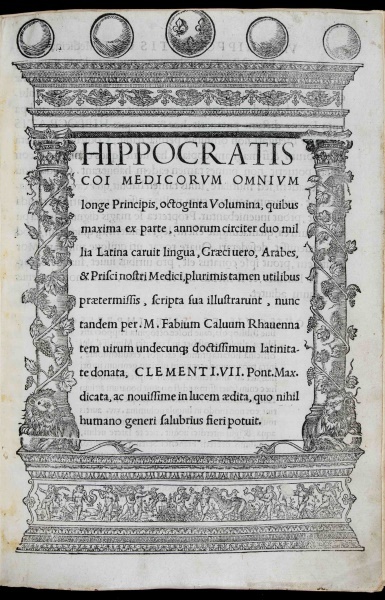Hippocrates: The Hippocratic Corpus
“Art is long, life is short.”
So said Hippocrates in his Aphorisms, and the dictum certainly holds true for the great physician himself. Hippocrates is arguably the most influential physician ever to live. Though few medical practitioners today would follow his recommended courses of treatment, he is rightfully called “the father of medicine.” His scientific approach to medicine, his theory of bodily humors, and his articulation of medicine as a profession have continued impact into the twenty-first century.
Born on the Greek island Cos around 460 BC, Hippocrates came into a world where illness was viewed as supernatural rather than natural. Though people had long treated sickness and injury with folk medicine, ailments were understood as the result of divine action. Treatment was akin to magic (Downs 21).
By his adulthood, however, the Greek golden age was in full swing. A contemporary of such greats as Plato and Herodotus, Hippocrates approached medicine in the same spirit in which they approached philosophy and history: He put it on a rational footing. Hippocrates argued that diseases had natural, material causes and that the body and its ailments must be understood holistically. The patient, rather than the illness, should be treated (Stathern 6). Moreover, his beliefs moved beyond theory—something many subsequent views of medicine would fail to do—and into practice. Believing that close observation of symptoms placed in the context of lifestyle and environment were the key to prognosis, potential cure, and prevention, Hippocrates kept case studies of his patients (Smith 48- 49). Even his now widely rejected theory of the humors was based on observation.
For example, observing that patients exhibited runny noses more often in winter, he concluded that when the body was too cold it produced excess phlegm and that this substance came from the brain (Strathern 8). Today, we know that “colds” (so called, thanks to Hippocrates) are caused by viruses. His observation fits experiences so well that many people cannot help but partially agree with him.
The fact that Hippocrates’s theories can be disproved underscores their scientific nature; an idea of illness based on divine agency for example, cannot be proven or disproven. Thus, even Sir Francis Bacon argued that Hippocrates’s approach fit his own understanding of the “new science,” what we now call the scientific method (Smith 18).
Nonetheless, some scholars accuse Hippocrates of violating his own principles (Strathern 10), and, indeed, much of his humoral theory seems preposterous today. He believed that the body comprised four liquids, or humors—blood, phlegm, yellow bile (choler), and black bile (melan)— produced in the heart, brain, liver, and spleen respectively. Each had properties of wetness or dryness, heat or cold. These humors impacted both physical health and personality. Illness resulted from an excess of one of these humors, creating an imbalance. Cures and health maintenance resulted from restoring balance, either by invoking opposites—often through food and drink—or by reducing the excess humor through purgations, emetics, and bloodletting. These ideas, recorded by Hippocrates and his followers over the course of a century, came to be known as the “Hippocratic corpus.” Many Hippocratic ideas and practices continued into the mid-nineteenth century.
To this day, our expressions and food choices bear the legacy of Hippocrates and his followers. The “common cold,” “sanguine,” “phlegmatic,” “melancholy,” and “humor” originate with Hippocrates. So too do expressions such as “to vent spleen,” “don’t get your choler up,” “all wet,” and “a dry sense of humor.” Common ways of speaking about food and traditional ideas about pairings stem from Hippocrates as well. We speak of “dry” wine and “hot” spices. Salad dressing of oil and vinegar comes from the opposing nature of these liquids—hot and wet, versus cold and dry (Albala 259).
Though few people today are aware of Hippocrates’s impact on figures of speech and food choices, nearly everyone has heard of his oath. Believing that physicians needed to follow an ethical code of conduct, Hippocrates created his oath, which doctors profess, thereby turning medicine into a profession. To this day, almost all medical students take a version of this Hippocratic Oath before becoming doctors. Though its exact interpretation and wording have been subjects of controversy over the years, the general exhortation to “do no harm” shapes the medical profession to this day.
This copy of the Hippocratic Corpus, known as the Octoginta volumina, is a firstedition printing of the work translated from Greek into Latin by Marcus Fabius Calvus and printed in Rome in 1525 by Franciscus Calvus. Just as Hippocrates was a man of the Greek golden age, Calvus was every bit a Renaissance man. This edition and translation belongs very much to the time of “rediscovering” the great works of antiquity. The fairly recent invention of the printing press and the work of editors and translators including Calvus allowed for the dissemination of these great works to a much wider audience.
—Bobbi Sutherland, PhD, Assistant Professor, History
Bobbi Sutherland, assistant professor of history, explains Hippocrates’s four humors and the contemporary use of Hippocratic ideas in our everyday understandings of food, medicine, and health. Interview is an online supplement to the University of Dayton exhibit Imprints and Impressions: Milestones in Human Progress—Highlights from the Rose Rare Book Collection, held Sept. 29 through Nov. 9, 2014.

